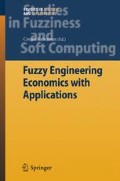Abstract
Depreciation is an income tax deduction that allows a taxpayer to recover the cost of property or assets placed in service. Straight line depreciation is the most frequently used method of depreciating new equipment for financial statements. Accelerated cost recovery systems include the methods like declining balance depreciation and sum-of-years digits depreciation. Incomplete information about the future values of the parameters in an after-tax rate of return analysis causes us to use the fuzzy set theory. This chapter includes the fuzzy after-tax cash flow analyses in case of fuzzy cash flows, fuzzy depreciation, fuzzy tax rate, and fuzzy minimum attractive rate of return with numerical examples.
Access this chapter
Tax calculation will be finalised at checkout
Purchases are for personal use only
Preview
Unable to display preview. Download preview PDF.
References
Berg, M., Waegenaere, A.D., Wielhouwer, J.L.: Optimal tax depreciation with uncertain future cash flows. European Journal of Operational Research 132, 197–209 (2001)
Hartman, J.C., Liedtka, S.L., Snyder, L.V.: The impact of US tax depreciation law on asset location and ownership decisions. Computers & Operations Research 34(12), 3560–3568 (2007)
Jacco, L., Wielhouwer, A.D., Waegenaere, P., Kort, M.: Optimal tax depreciation under a progressive tax system. Journal of Economic Dynamics & Control 27, 243–269 (2002)
Joseph, C.H., Stephen, L.L., Lawrence, V.S.: The impact of US tax depreciation law on asset location and ownership decisions. Computers & Operations Research 34, 3560–3568 (2007)
Keating, A.S., Zimmerman, J.L.: Depreciation-policy changes: tax, earnings management, and investment opportunity incentives. Journal of Accounting and Economics 28(3), 359–389 (1999)
Wang, M.J., Liang, G.S.: Benefit/Cost analysis using fuzzy concept. Engineering Economist 40(4), 359–377 (1995)
Newnan, D.G., Lavelle, J.P.: Essentials of engineering economic analysis. Oxford University Press, Oxford (1998)
Robinson, J.: After tax cash flow analysis. Journal of Property Valuation and Investment 5(1), 18–29 (1987)
Scott, K., Jerold, L.Z.: Depreciation-policy changes: tax, earnings management, and investment opportunity incentives. Journal of Accounting and Economics 28, 359–389 (2000)
Author information
Authors and Affiliations
Editor information
Rights and permissions
Copyright information
© 2008 Springer-Verlag Berlin Heidelberg
About this chapter
Cite this chapter
Kahraman, C., Kaya, İ. (2008). Depreciation and Income Tax Considerations under Fuzziness. In: Kahraman, C. (eds) Fuzzy Engineering Economics with Applications. Studies in Fuzziness and Soft Computing, vol 233. Springer, Berlin, Heidelberg. https://doi.org/10.1007/978-3-540-70810-0_10
Download citation
DOI: https://doi.org/10.1007/978-3-540-70810-0_10
Publisher Name: Springer, Berlin, Heidelberg
Print ISBN: 978-3-540-70809-4
Online ISBN: 978-3-540-70810-0
eBook Packages: EngineeringEngineering (R0)

